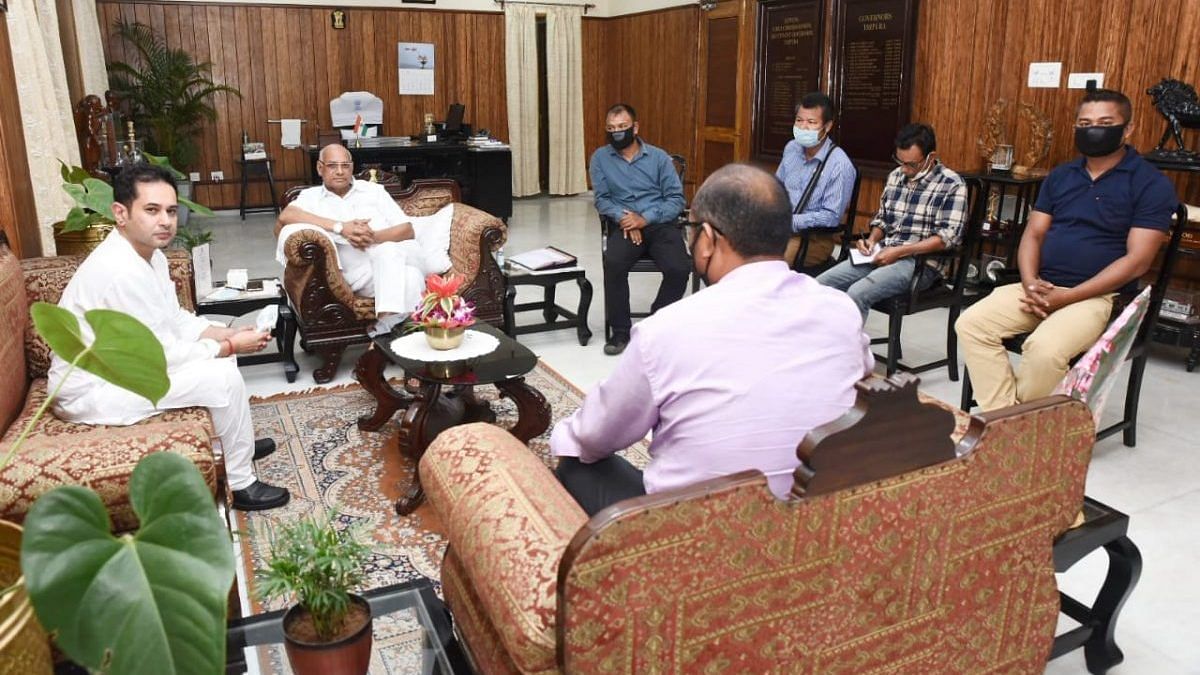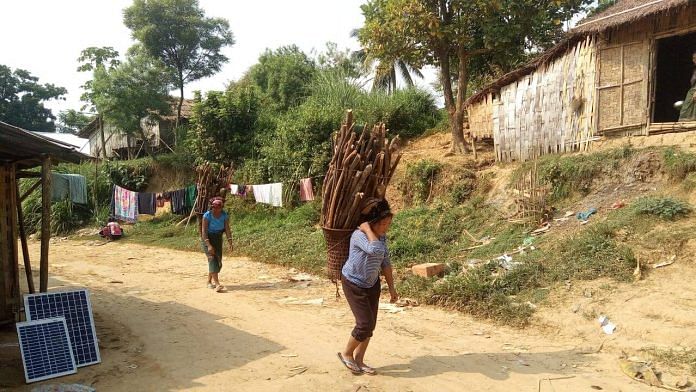Guwahati: For the displaced Brus, a number of them moved from Mizoram and confined to seven temporary camps in North Tripura, life has been made harder due to the Coronavirus pandemic even as the community looks for a speedy and permanent resettlement within the state of Tripura as assured in the quadripartite agreement signed with the Modi government 10 months ago.
Having to survive on “insufficient” funds and rations doled out by the state, the Bru Internally Displaced Persons (IDPs) have been left without any income for months, with most of them having little or no savings to fall back on.
The leaders of five Bru organisations had on 23 October taken up their grievances with Tripura Governor Ramesh Bais and Chief Minister Biplab Kumar Deb, urging for speedy implementation of the agreement.

For over two decades, the displacement issue had remained unresolved until an agreement was signed on 16 January — between the Government of India, Government of Tripura and Mizoram and Bru community representatives in New Delhi.
As part of the agreement, around 35,000 Bru refugees would be settled permanently in Tripura with the Centre sanctioning a Rs 600-crore settlement package. However, resettlement plans have suffered a delay due to the Covid-19 crisis.
“I think this is just the beginning. These displaced people who trace their roots to the erstwhile state of Tripura need to be repatriated,” said Pradyot Manikya, scion of the Tripura royal family and one of the signatories of the agreement with the central government. “If we can have people from another country come settle in the Northeast, then why can’t we allow people who were displaced, or who at one stage belonged to the Kingdom of Tripura to live a life of respect within India.”
“As of now, the government has decided to settle them in equal areas with the approval of local people. They will be settled in clusters so that they can protect their traditions, language and culture,” Pradyot added.
“The government has ensured that our demands would be addressed. We have also submitted a memorandum. Our people are facing a lot of problems since lockdown,” Bruno Mwsha, secretary of Mizoram Bru Displaced Peoples’ Forum (MBDPF), a committee of Bru refugees that spearheaded the repatriation and resettlement issues, told ThePrint.
“We are dependent on government relief, but it is not sufficient,” Mwsha added. “Many were earning their livelihood as daily wage earners within and outside the state. Those who were working outside in private and government sectors have returned to their respective camps and have not been able to earn a single penny.”
Also read: Mizoram reports first Covid-related death, 7 months after first case was reported
Why did Brus leave Mizoram?
The Brus are one of the oldest ethnic minority groups in Northeast spread across Tripura, Mizoram and southern Assam.
In Mizoram, they are scattered in Kolasib, Lunglei and Mamit districts. While the Reangs (Brus) are animists or nature worshippers practicing rituals somewhat similar to Hinduism, 80 per cent of the Mizoram Bru community is comprised of Christian converts. The Bru Hindus constitute 60 per cent of the refugee population in Tripura. They had migrated from Tripura to Mizoram sometime in the 19th century.
The ethnic conflict between the majority Mizos and the Brus in October 1997 had forced about 30,000 Brus to flee Mizoram and land in Tripura. The conflict was triggered by the murder of a forest official by the suspected Bru National Liberation Front (BNLF), following which a circular was supposedly issued asking Bru headmen to evacuate their villages fearing a backlash.
Since then, the Bru IDPs have been living in the seven camps of Kanchanpur and Panisagar sub-divisions of North Tripura district. Another displacement of about 5,000 Brus took place in November 2009 following the death of a Mizo youth in Mamit district.
Hardships multiply during Covid-19 crisis
So far, three persons from the Bru community living at the Naisingpara relief camp under Kanchanpur sub-division have tested positive for coronavirus.
“Even a single mask has not been provided by the government, and due to insufficient relief, many of our people could not manage to purchase masks. Whenever they are stopped by police, they are fined Rs100-200 for not wearing masks,” said Mwsha.
The displaced Brus do not have voting rights in Tripura yet; they are neither entitled to work under the MGNREGA nor given any farmland to earn their livelihood.
“The adults get Rs 5 per day while half of that is received in cash by every minor,” Mwsha said. “Before the pandemic, our people used to survive on daily wage work in the informal sectors — the wage per day in local areas of Tripura is Rs 250. Now, they are still trying to find daily work.”
Also read: Assam minority students’ union to move SC as NRC coordinator tells DCs to prune final list
‘Living under harsh conditions’
Among the many youths who quit jobs outside the region and returned home is a 32-year-old Bru from Mizoram who shared his story with ThePrint, not wishing to be named.
“I am just staying home and waiting for this pandemic to get over. I have to search for another job then,” said the young music enthusiast who was working at a private company in New Delhi until last year and has returned to one of the camps after 23 years. On condition of anonymity, he also revealed the plight of the IDPs in the camps.
“All the families have been living in harsh conditions — there is no drinking water facility, sanitation, no electricity, no proper education system for children, and not even basic healthcare facilities,” he said. “There is nothing here. I am at a loss thinking whom to blame — the government or the people taking care of the camps.”
He added that his grandmother had “died of starvation” at the camp when the Centre had stopped providing free ration and cash-doles in October last year during the last repatriation attempt.
Since 2010, almost 2000 Bru families returned to Mizoram in nine phases of repatriation, but most of them want to come back to Tripura due to security apprehensions.
In the 23 October meeting with the Governor and chief minister, the Bru leaders also stressed on the need to update the number of ‘split families’ to avail ration cards for separated family members.
These families that split-up due to marriage, divorce or other issues have their names enlisted in a single ration card with the Tripura government yet to approve the revised numbers.
Among other resettlement issues, the enrolment of Bru names in the electoral rolls of Tripura and issuing residential and Scheduled Tribe certificates to the IDPs were also discussed.
Also read: ‘Wanted to know how it feels to fly’ — 82-year-old grandmother is Sikkim’s oldest paraglider




Mizoram is a rogue state. It officially discriminates against non-Mizo residents of the state. Non-Mizos are treated as second class citizens.
The Centre must impose President’s rule over the state and give s free hand to the armed forces to deal with criminal elements like the various youth organizations.